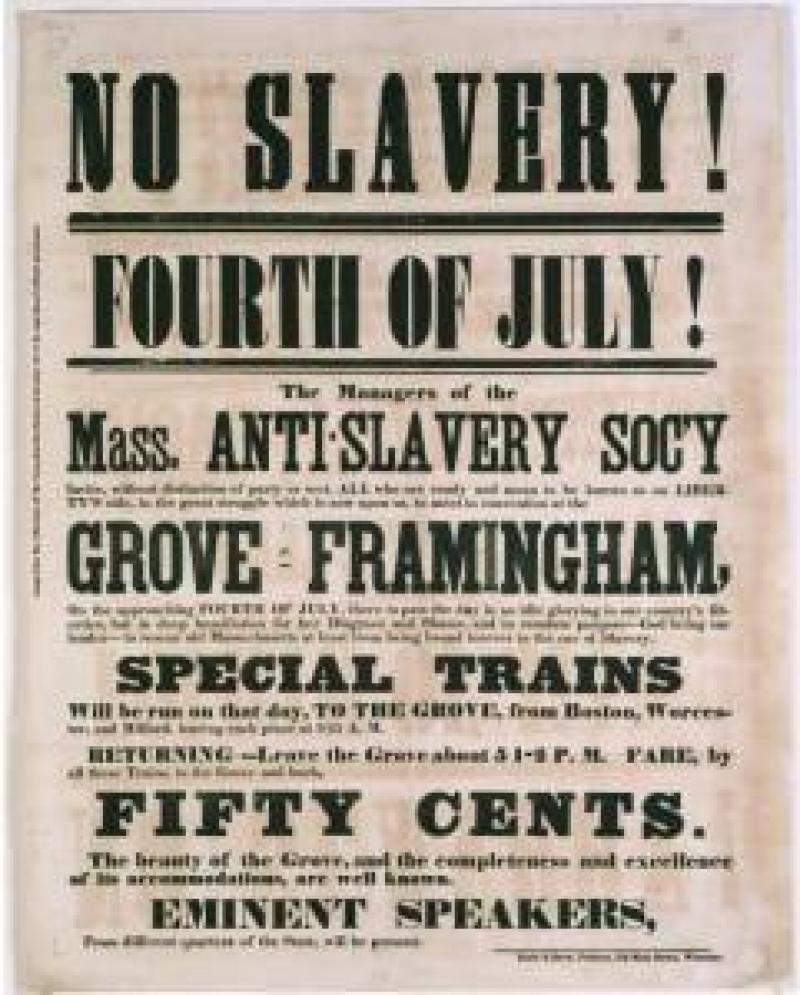'Originalism' = Garrison's Constitution, a Covenant with Death
By: Fred Clark (slacktivist)


The most important thing about William Lloyd Garrison's burning of the Constitution is this:
He was right.
The document he burned -- the U.S. Constitution of 1789 -- truly was the source and parent of atrocities.
Maybe August 1619 is not the single most
important moment in American history,
but it is very close.
BIDEN
2020


If only he hadn't been so prickly and antagonistic, we were taught, then he might have had more success. If only he'd been more winsome, more willing to give others the benefit of the doubt, then perhaps millions of his countrymen wouldn't have felt compelled to commit treason in defense of slavery.
Exhibit A for the case against the polarizing and controversial Garrison was the abolitionist rally he led on July 4, 1854. The stage that day was adorned with an American flag hanging upside down and draped in black mourning cloth — a shocking affront, our textbook suggested, to patriots who loved that flag. And then things got even more extreme and polarizing. Garrison held up a copy of the Fugitive Slave Law of 1850 and burned it to ashes. Then he held up copies of the orders of two local judges upholding that law and burned those as well.

Garrison set fire to the Constitution, crying "So perish all compromises with tyranny! Let all the people say 'Amen.'"
That sort of thing, our schoolbooks said, was just taking things way too far. How did Garrison expect to win over his fellow Americans by setting fire to the most sacred of all their founding documents? And on the Fourth of July, no less. That sort of shocking, rude behavior, accounted for the main lesson we schoolchildren were meant to learn about William Lloyd Garrison: that his failure to bring about the change he hoped to see was his own fault. You can't go around burning the Constitution and expect anyone to listen to what you have to say after that.
Again, this lesson wasn't entirely wrong. Garrison's burning of the Constitution really was "polarizing" and "controversial." But saying so and leaving it at that is like telling students, "Here's what you need to know about Sophie Scholl: She was polarizing and controversial, she refused to work through proper channels, and she framed her message in a way that was bound to antagonize loyal patriots."
That's all technically true, but it's also wholly beside the point.
Because the most important thing about Garrison's burning of the Constitution is this: He was right . The document he burned — the U.S. Constitution of 1789 — truly was the source and parent of atrocities. It was a compromise with tyranny, a covenant with death, and an agreement with Hell. The murderous injustice it upheld and protected and enshrined was every bit as indefensible as the monstrous horror opposed by Sophie Scholl a century later.
Garrison's infernal Constitution was James Madison's Constitution — a document created, explicitly, to ensure that human trafficking and bondage would remain both legal and politically privileged in perpetuity. Garrison and his fellow abolitionists had earlier believed that the Constitution could be reformed and redeemed, that American law could be legally changed through legal channels, gradually eliminating slavery while preserving the original constitutional union. And so they studied it.
The abolitionists became, in effect, the original "originalists," inspecting not just the letter of the law, but all of the debates and surrounding documents demonstrating the intent and the effect of the Constitution as designed. Garrison's colleague, Wendell Philipps, summarized this legal scholarship in his book The Constitution A Pro-Slavery Compact; or, Selections from the Madison Papers, outlining the full extent to which that Constitution not only protected slavery, but deliberately created a political system incapable of stopping it. As long as that Constitution existed, so would slavery.
Paul Finkleman traces that argument in a two-part article on "Garrison's Constitution," running through many of the ways that 1789 document protected and politically privileged slavery. These legal obstacles to reformation, emancipation, and abolition were insurmountable, impervious to attempts to change them within the political system it created.
What both Finkleman and I refer to as "Garrison's Constitution" is the document he denounced and set on fire. It was Garrison's not in the sense of being his handiwork or his preference, but because it was his nemesis, his foe, his target.
And ultimately, Garrison outlived that Constitution.
The Constitution that Garrison burned in effigy — Madison's pro-slavery compact of 17989 — no longer exists. It was destroyed and rebuilt not because William Lloyd Garrison burned a copy of it, but because William T. Sherman burned Atlanta. The war and the post-war Reconstruction Amendments transformed Madison's original document into something new, something else — something that was no longer a compact with death and an agreement with Hell.
The defenses of slavery built into Madison's Constitution remain, and not solely as relics. The weird distortions of democracy and representation originally intended to privilege slaveholding states continue to privilege some voters at the expense of others. But the Reconstruction Amendments truly were radical and revolutionary. They weren't simply later additions to the pre-existing Constitution, they changed the meaning of the rest of that document. The addition of the 13th, 14th, and 15th Amendments altered the legal and constitutional meaning of the first 10 amendments, making that Bill of Rights real and binding in a way that it never was in Garrison's time.
That transformation is seen by many today as intolerable and illegitimate — a betrayal of the "original" Constitution that must be undone by treating the Reconstruction Amendments as illegitimate and nonbinding. The new birth of freedom, the second founding that followed the Civil War, is ignored and dismissed by these revisionist legal activists who are determined to take us back to the same document that Garrison set on fire in 1854.
That is what "originalism" means today. It means the false pretense that the pro-slavery compact of 1789 is the sole basis of legitimate legal authority while the transformed Constitution of the second founding is inconsequential. It means ignoring the law as it is in favor of the law as it was, thereby reaffirming both white supremacy and the political privileging of property.
And this view — a reassertion of the damnable agreement with Hell — is now the agenda of two-thirds of the highest court. The fact that this Neo-Confederate counter-revolution is being carried out under the rhetoric of "the sanctity of life" only makes its advocacy for the covenant of death all the more reprehensible.

Tags
Who is online
461 visitors



What is wrong - morally wrong - with the American people that we can still be dithering over slavery?